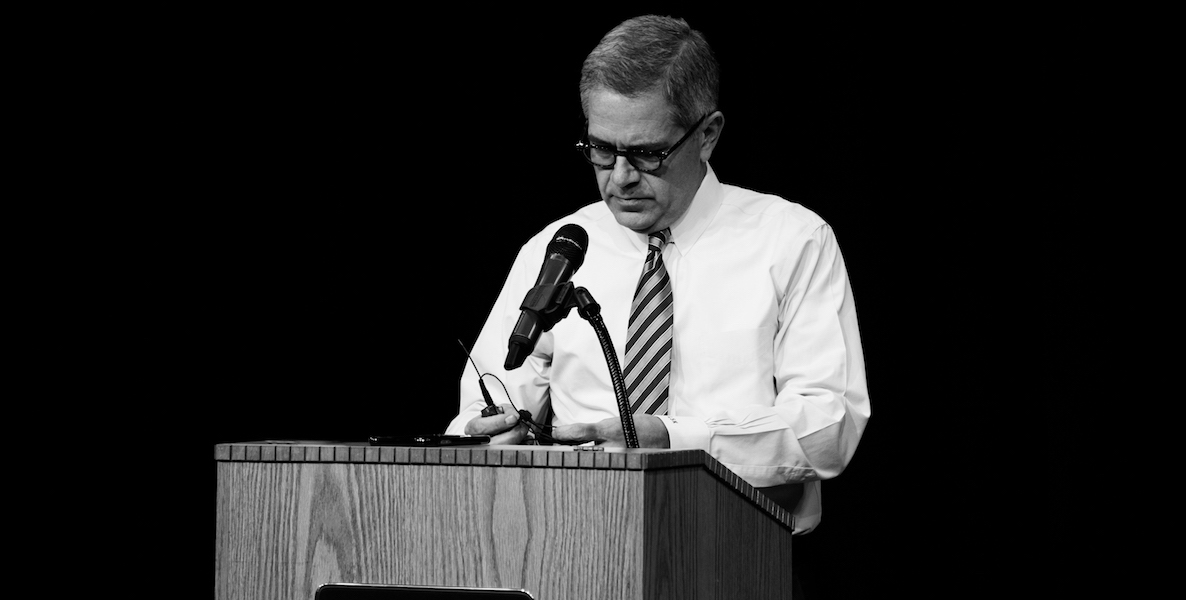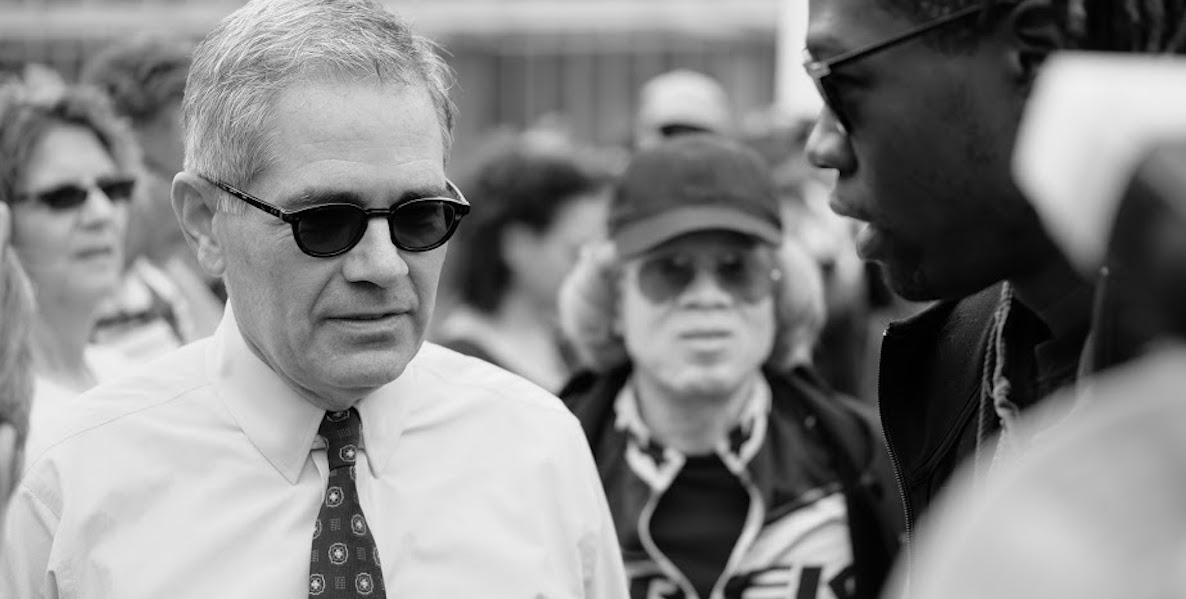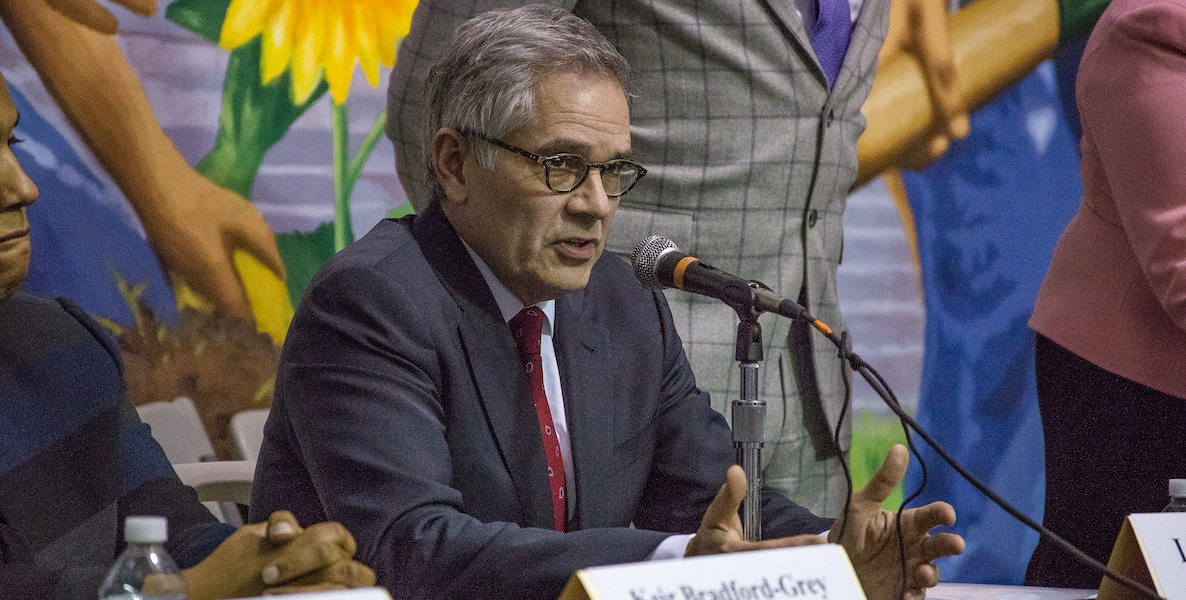“Just as every cop is a criminal and all the sinners, saints”
—The Rolling Stones, Sympathy for the Devil
Make no mistake about it: We’re ground zero in a revolution, an epochal moment that asks—without necessarily answering—big questions: What is crime? What is punishment? What makes up our social contract? Throughout the country, funded by billionaire George Soros, a new breed of District Attorney has been taking the reins of power; when former public defender Mark Gonzalez, who has the words “Not Guilty” tattooed across his chest, was elected District Attorney in 2016 in Nueces County, Texas, it was a harbinger of sweeping change. The lines in our adversarial justice system were blurring. You could see it in our D.A. race last year, when ultimate victor Larry Krasner swung the debate leftward and suddenly those running to be our chief law enforcement officer sounded like they were seeking to become our Public Defender In Chief.
Now that Krasner, a lifelong defense and civil rights attorney who sued the Philadelphia police force some 75 times, is three months into his rocky tenure, it’s become clear that the revolution is upon us and that Krasner has become its poster boy. I’ve spent a good part of the last few weeks talking to former and current prosecutors, as well as police and victims. And let me tell you: They’re freaking out. They see Krasner as an existential threat; he’d say he is a threat—to the status quo of an unjust system. They counter that he’s ultimately a threat to safety on our streets.

Prefer the audio version of this story? Listen to this article on CitizenCast:
Audio Player
A couple of things are undeniable. One is that, all eyes are on him. Krasner is among those select few holding the key to the future of big city criminal justice reform. The Krasner experiment may very well determine whether it’s possible to Reform and Protect: Can you be a progressive District Attorney and, at the same time, keep your city safe? If the answer to that is no, it puts at risk the whole movement to reform the criminal justice system from the inside.
Yes, the system needs reforming, but the number one job of both police and District Attorney ought to remain keeping the streets safe for law-abiding citizens. We don’t hear a lot of rhetoric from Krasner about that mandate. “He doesn’t think first of victims, or potential victims,” says one former Assistant District Attorney.
What’s also undeniable is that Krasner is off to a bumbling start. He’s someone who has never managed even a mid-sized organization before and his moves—the rash firings, the dissing of victims, the vengeful personnel moves—all speak to not being ready for primetime. But the question before us should be: Is Krasner merely incompetent, or does his tenure thus far represent the toxic mix that comes when you pair inexperience with the arrogance of an ideologue?
I’ve written before that many of Krasner’s reforms—as with those of many of the other Soros D.A.’s—are long overdue. Cash bail does criminalize poverty; mass incarceration, thanks to an ill-conceived war on drugs, has decimated communities of color; the death penalty is disproportionately applied based on race and class. All true. But one has to wonder if Krasner—even more than the other Soros-funded reformers—has over-corrected, and laid the groundwork for an existential assault on law enforcement from within that, by extension, could amount to a jihad on public safety itself.
Find Out More About Solving Homicides Do Something
Hardly anyone in our law enforcement community wants me to quote them by name. Krasner has already earned a Trump-like reputation for testing loyalty and exacting revenge. When, on day one, he fired those 31 prosecutors—eviscerating the homicide unit—we heard tales about how many of those dismissed had had previous run-ins either with Krasner or his wife, Judge Lisa Rau; one of the few things former DAs Seth Williams and Lynne Abraham agreed on was that Rau was soft on crime and, in Abraham’s words, harbored an “institutional bias against police officers.”

Listen to Larry Platt on WURD’s Reality Check with Charles D. Ellison:
Audio Player
In his first address to his staff, ADAs wondered if the video cameras focusing on him and the crowd were a Big Brother-like way to scope out who was with and who was against him; as he explained, “The coach gets to pick the team.”
I chalked those ADA concerns up to the usual type of drama incurred by change. He was shaking things up. But then came last week’s devastating Inquirer story about how Krasner, in his zeal to decarcerate, is challenging the long-held notion that most convicted killers should be sent to prison for life and, in doing so, is also not being transparent with victims’ families—also in defiance of state law.
Krasner is among those select few holding the key to the future of big city criminal justice reform. The Krasner experiment may very well determine whether it’s possible to Reform and Protect: Can you be a progressive District Attorney and, at the same time, keep your city safe?
That story details how Krasner’s handpicked chief of homicide, Anthony Voci, actually argued to reduce a third degree murder charge to voluntary manslaughter in the case of last year’s barroom slaying of Christopher Johnson; the victim’s best friend observed that Voci “defended the defendant better than his own counsel.” Privately, the case’s ADA, Allison Borgatti, an accomplished prosecutor, expressed her disagreement with Voci’s move. Whereupon she was reassigned—demoted—to the charging unit and relegated to working the night shift, before she resigned. Krasner said the move wasn’t a punishment, that the charging unit legitimately needed an experienced prosecutor. “That’s bullshit,” one ADA told me.
“Sending a prosecutor to charging is classic DA punishment,” says a former ADA. “Everyone knows it. To say it isn’t is laughable.”
Of course, you could chalk all this up to inside baseball, except for the substance of the offense Borgatti was perceived to have committed: She was, in effect, arguing that it is not reform to let violent offenders off with lenient charges. The Krasner revolution, in other words, is not just about much-needed cash bail, death penalty, and marijuana reform. It’s also about lesser charges, plea bargains and seeking lighter sentences in cases of violent crime. And that’s where you wonder if Krasner is channeling Mick Jagger circa 1968 and—blinded by ideology—not clearly seeing his central challenge: To make the system more just and more safe at the same time.
Stories About Larry KrasnerRead More
For all the talk of much-needed reform, few know that, as it stands now, most people can get away with murder in Philadelphia—and the cost of that inconvenient fact disproportionately falls on African American victims. The homicide clearance rate is around 40 percent; that means that 6 of every 10 murders here go unsolved.
When asked why we can’t solve our murders, the cops I’ve spoken to—who can also be driven by ideology—point to the culture of no snitching that predominates throughout the city, as well as to the voluntary civil liberty reforms enacted in 2014 by then-Commissioner Charles Ramsey, such as rules that prevent cops from taking crime scene witnesses into custody. But one former tough-on-crime ADA scoffs at the excuse-making, pointing out that other cities have the same culture and rules, and they seem to find a way to solve their murders: “Those reforms were adopted because cops would take suspects and hold them in what they called ‘The Hotel’ for 12 hours and walk out with a story, like it was still the 1950s.”
Uh, shouldn’t solving those murders kind of be our number one priority?
Krasner’s contribution to combatting the abysmal clearance rate, one former ADA says, is that he is already bringing cases that are light on evidence—reliant on one witness, for example—and then pleading them out. That, the theory goes, combined with charges that are below sentencing guidelines, will usher in a new era of revolving door justice. The result just may be an interesting and unfortunate trifecta: The clearance rate starts rising, the prison population continues to shrink, but the crime and murder rate—which so far is holding steady at last year’s rate, the highest in 5 years—climbs again.
That scenario, of course, remains to be seen. But what is clear right now is that Krasner has a blind spot when it comes to victims of crime. There are too many examples to recount, but perhaps the most egregious was agreeing to a delay sought by defense attorney Michael Coard (who supported Krasner in the election) in the trial for the horrific 2015 murder of police Sgt. Robert Wilson—without talking to Wilson’s family, which prompted them to accuse Krasner of “favoring the criminals.” By the way, let’s pause over the substance of what Krasner agreed to: In what universe ought it take over two years to get to trial in a case in which a police officer is assassinated?
In response to recent criticism, last week Krasner unveiled a victims’ advisory panel. But an advisory panel can’t fix him; I’ve spoken to victims’ families who report that, face to face, they feel viewed as an inconvenience to be dealt with, not as a partner in the quest for justice. That comports with the public Krasner, doesn’t it? The one who only seems to come alive when he’s talking about the injustice of the system he now represents?
For all the talk of much-needed reform, few know that, as it stands now, most people can get away with murder in Philadelphia—and the cost of that inconvenient fact disproportionately falls on African American victims. The homicide clearance rate is around 40 percent; that means that 6 of every 10 murders here go unsolved.
Often, victims of violent crime find themselves up against an ideology in Larry Krasner’s justice system. Like the mother of a slain 24-year-old who was told by someone in the District Attorney’s victim services unit that the man who killed her son “deserves a second chance.”
“Not everyone in the world thinks like that,” this mother told me. “That’s a very personal thing. If he gets out in 10 or 15 years, what, I’m going to see him in the neighborhood? Run into him in the supermarket? That man took my son.”
That victim talks movingly about how she’s found herself in a Kafkaesque farce, but what she doesn’t know is that the Revolution she’s an unwitting character in actually has a playbook. Tell me if this sounds familiar:
Thanks to Soros money, Houston elected Kim Ogg its first Democratic DA in 36 years in 2016. She announced her presence with authority, dismissing 37 prosecutors; as Chief of Staff, she hired a progressive defense attorney who was hosting a public-access show. Since her election, Ogg has admirably reformed the way marijuana cases are prosecuted and has sought to end cash bail. But there have also been a rash of cases where plea bargaining or light charging has resulted in violent crime on the streets. In one case, a man shot at police deputies, narrowly missing them, but received probation instead of going to jail.
Houston police chief Art Acevedo had had enough after a state trooper was fatally shot during a traffic stop. The assailant had two previous arrests for assaulting a police officer and was out on a $15,500 bond.
“We’re starting to find a myriad of cases where individuals that have committed aggravated assaults are out on relatively low bonds and committing other aggravating crimes,” he told The Houston Chronicle.
Might Houston’s story, with its 8.9 percent increase in violent crime last year and its holding steady at a five-year high murder rate, be a distressing coming attraction of ours? The particulars are eerily familiar, after all, right down to Ogg’s hiring of a defense attorney as her top aide. Krasner has seen that move of Ogg’s and doubled down on it, hiring 83-year-old former Common Pleas judge and onetime public defender Carolyn Engel Temin and former public defender Robert Listenbee as his first assistants.
Temin…Temin…Temin. The name rang a bell. It sent me back into the archives. There it was, in 1998, a series of Daily News columns by Dan Geringer, calling her the “Queen of Murder Light” for handing out what he characterized as light sentences in two city killings. In one column, Geringer quoted then-Councilman Jimmy Kenney, who accused Temin of being far too lenient. One day, the councilman said, the judge may just have an unfortunate run-in with “one of the characters she keeps putting back out on the street.”
Now Temin is part of a triumvirate running the DA’s office in Kenney’s Philadelphia, and the risk is suddenly the same as Kenney identified 20 years ago: More bad actors on the street, preying on those who play by the rules.
Krasner, ever self-assured, has said that, with him, Temin and Listenbee running things, the DA’s office now has “three locomotives…the train goes faster, and the train can carry more.”
For all its faults and excesses, the American justice system is, by design, an adversarial system that requires both sides to be zealously represented and a judge to serve as referee. Well, the Krasner revolution just might represent unilateral disarmament by one side in that already fragile equation. Be careful what you wish for. What’s scary about Krasner is all that he’s blind to, including the fact that he describes his leadership team as running a locomotive, never stopping to think that he just may be foreshadowing a train wreck.
Photo: City Council via Flickr





